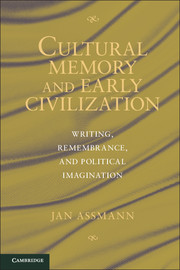6 - The Birth of History from the Spirit of the Law
from Part II - Case Studies
Published online by Cambridge University Press: 05 June 2012
Summary
Semiotization of history under the signs of reward and punishment
In the context of cultural memory, Israel provides us with a paradigm for two equally important phenomena: damming the stream of tradition by canonization, and initiating historiography. The two are closely related. The common ground here is provided by the ethnogenetic process through which a collective identity is established with the support of a canonized tradition driven by the mythomotor of an internalized history. This theoretical interpretation corresponds to the classical paradigm, which also brings canon and history together in the closest possible fashion. We read, for instance, in Josephus: “Our books…are only 22 in number and contain a report on all times. 5 of these are the books of Moses, which contain the laws and traditional history from the origin of man to the death of the law-giver. History from Moses to Artaxerxes was written by the prophets in 13 books. The remaining 4 books contain hymns to God and precepts for the conduct of human life.” (See Chapter 7, Section 2 for further comment on this passage.) The first and most important parts of the Tanakh – the Torah and the Prophets – are subsumed here under the heading of history. “Damming the stream of tradition” is the task of historiography, which must decide on the one binding memory. The prophets are the bearers of this memory, and the end of prophecy is also the end of historiography: “From Artaxerxes to our own time there has been a tradition, but this does not enjoy the same esteem because the sequence of the prophets was broken.” The prophetic or “charismatic” history reached from Moses to Nehemiah, and their memories were set down in thirteen books. The special duty of memory that the Israelites were bound to fulfill had its origin in law. This was derived from the covenant Israel had made with God, and such a covenant made the strongest demands on the memory: every detail had to be memorized, preserved, and obeyed, and woe to him who left anything out, added anything, or changed anything. Both the famous canon formula and the imperative zakhor ve shamor! (Remember and keep!) originally had a legal meaning.
- Type
- Chapter
- Information
- Cultural Memory and Early CivilizationWriting, Remembrance, and Political Imagination, pp. 206 - 233Publisher: Cambridge University PressPrint publication year: 2011



